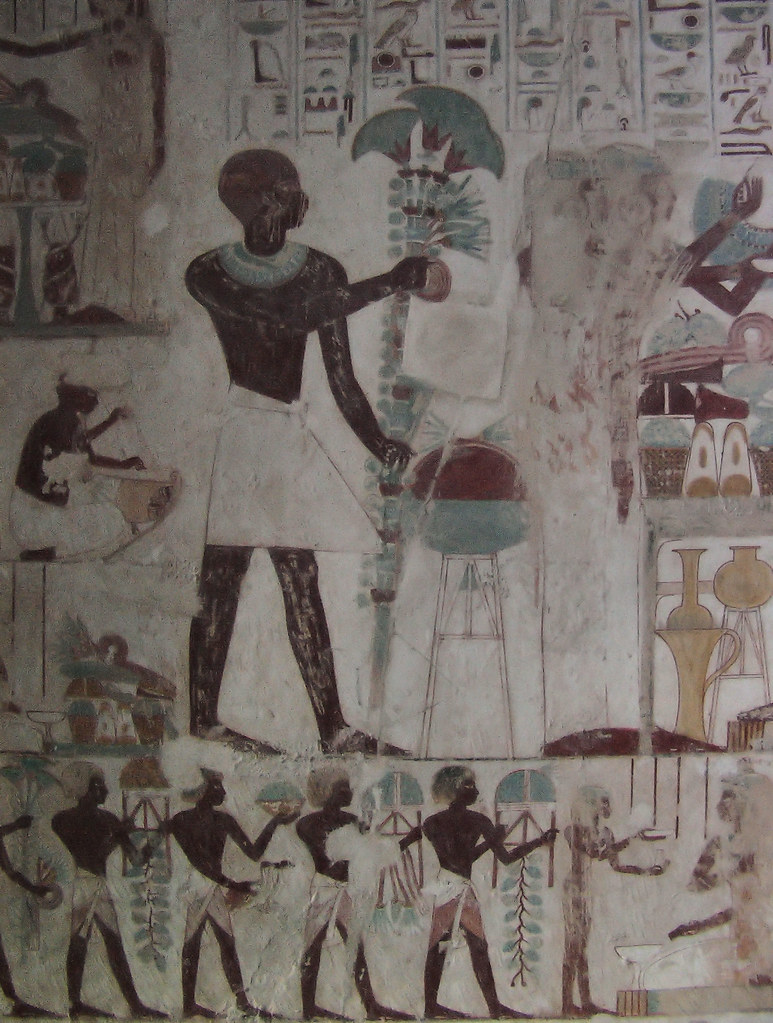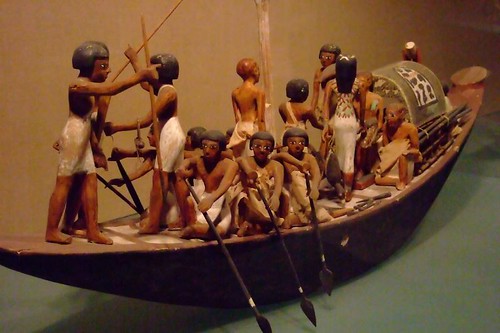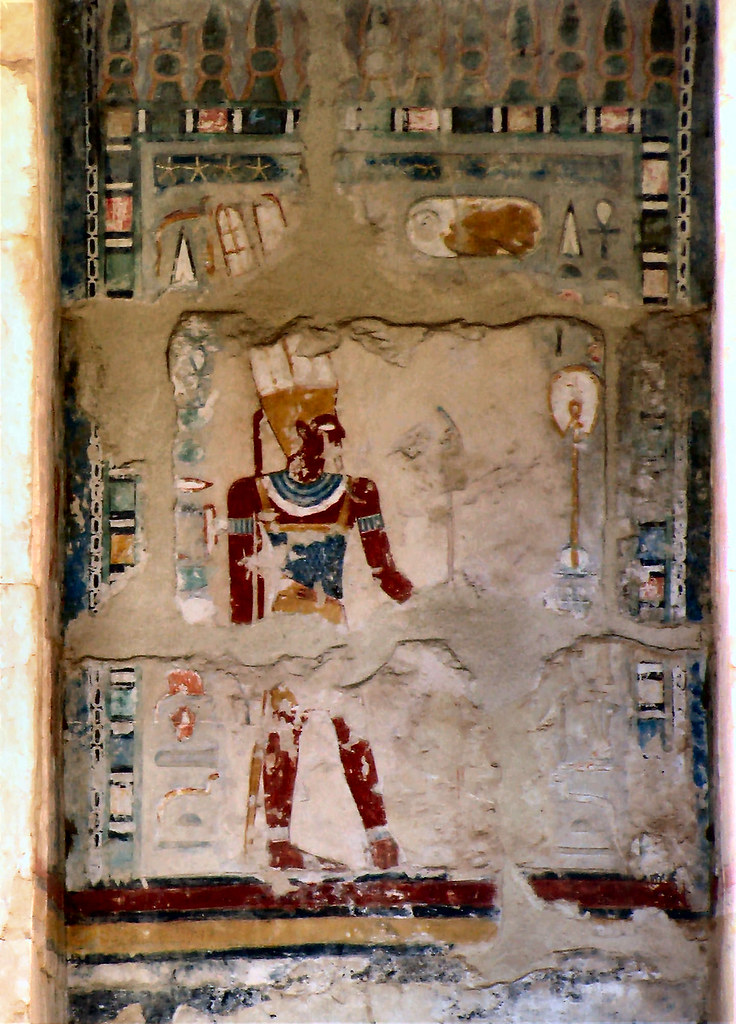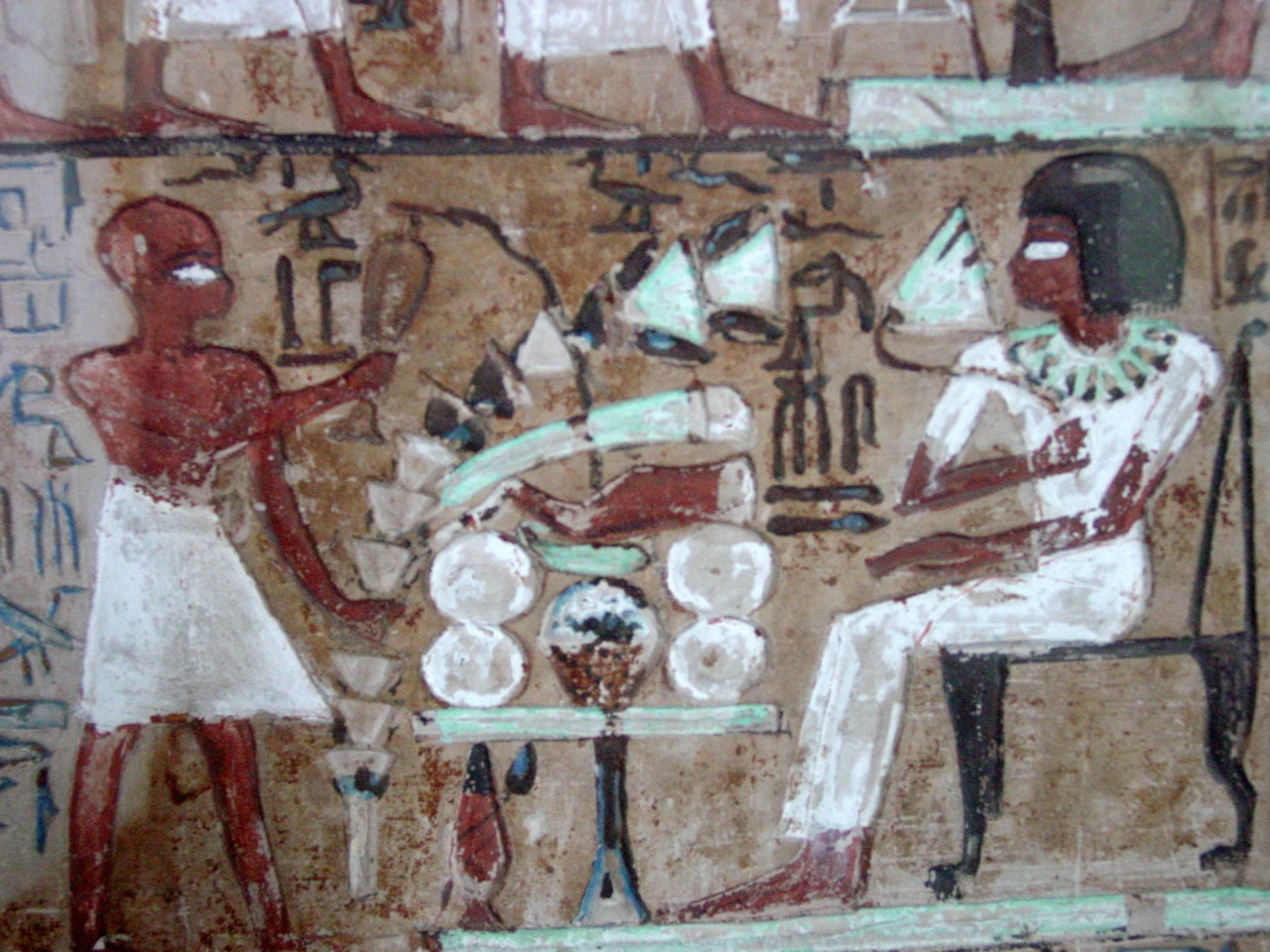When Our Fathers Ruled In Egypt - Culture - Nairaland
Nairaland Forum / Nairaland / General / Culture / When Our Fathers Ruled In Egypt (762 Views)
Jewish Rabbinical Court Ruled That Igbos Are Descendants Of Ancient Israelites. / Why Our Fathers Hate Beard, Culture Or Religion? / How IGALA Tribal Names “DIED” In The Hands Of Our Fathers (2) (3) (4)
| When Our Fathers Ruled In Egypt by Rossinky: 10:41pm On Feb 14, 2020 |
Our ancestors were COMMANDERS of North Africa and THE ''MIDDLE EAST''. WE RULED EGYPT FOR OVER 3000 YEARS. Egypt, a black African civilization, was the most dominant power in that region for THOUSANDS of years. There was no such place as the ''MIDDLE EAST'' in antiquity. That region was really just an outpost of African dominance that came to be later peopled by wandering Asiatic tribes. The ''MIDDLE EAST'' is a British-coined term which arose with colonialism in 1850. Tomb Art From Ancient Egypt, circa 3000 BC, showing clear black African populace and monarchy.       THE DOCUMENTARY EVIDENCE Note: All of Africa South of the Sahara was known to the ancient Greeks as ''Ethiopia''. Famous Greek historian, Diodorus of Sicily From his own statements we learn that he traveled in Egypt around 60 BC. His travels in Egypt probably took him as far south as the first Cataract. "They (the Ethiopians) say also that the Egyptians are colonists sent out by the Ethiopians, Osiris ["King of Kings and God of Gods] having been the leader of the colony . . . they add that the Egyptians have received from them, as from authors and their ancestors, the greater part of their laws." Diodorus's declared intention was to trace the origins of the cult of Osiris, alias the Greek Dionysus also commonly known by his Roman name Bacchus. The Homeric Hymn "To Dionysus" locates the birth of Dionysus in a mysterious city of Nysa "near the streams of Aegyptus" ...and much of Book 3 of the Bibliotheka Historica is devoted to the intertwined histories of Dionysus and the god-favored Ethiopians whom he believed to be the originators of Egyptian civilization. [emphasis added] (1st century B.C., Diodorus Siculus of Sicily, Greek historian and contemporary of Caesar Augustus, Universal History Book III. 2. 4-3. 3) Diodorus devoted an entire chapter of his world history, the Bibliotheke Historica, or Library of History (Book 3), to the Kushites ["Aithiopians"] of Meroe. Here he repeats the story of their great piety, their high favor with the gods, and adds the fascinating legend that they were the first of all men created by the gods and were the founders of Egyptian civilization, invented writing, and had given the Egyptians their religion and culture. (3.3.2). "Now they relate that of all people the Ethiopians were the earliest, and say that the proofs of this are clear. That they did not arrive as immigrants but are the natives of the country and therefore rightly are called authochthonous is almost universally accepted. That those who live in the South are likely to be the first engendered by the earth is obvious to all. For as it was the heat of the sun that dried up the earth while it was still moist, at the time when everything came into being, and caused life, they say it is probable that it was the region closest to the sun that first bore animate beings". Diodorus continues regarding the ancient black Africans south of the Sahara: "They further write that it was among them that people were first taught to honor the gods and offer sacrifices and arrange processions and festivals and perform other things by which people honor the divine. For this reason their piety is famous among all men, and the sacrifices among the Aithiopians are believed to be particularly pleasing to the divinity," "The Aithiopians say that the Egyptians are settlers from among themselves and that Osiris was the leader of the settlement. The customs of the Egyptians, they say, are for the most part Aithiopian, the settlers having preserved their old traditions. For to consider the kings gods, to pay great attention to funeral rites, and many other things, are Aithiopian practices, and also the style of their statues and the form of their writing are Aithiopian. Also the way the priestly colleges are organized is said to be the same in both nations. For all who have to do with the cult of the gods, they maintain, are [ritually] pure: the priests are shaved in the same way, they have the same robes and the type of scepter shaped like a plough, which also the kings have, who use tall pointed felt hats ending in a knob, with the snakes that they call the asp (aspis) coiled round them." "There are also numerous other Aithiopian tribes [i.e. besides those centered at Meroe]; some live along both sides of the river Nile and on the islands in the river, others dwell in the regions that border on Arabia [i.e. to the east], others again have settled in the interior of Libya [i.e. to the west]. The majority of these tribes, in particular those who live along the river, have black skin, snub-nosed faces, and curly hair". (Diodous Siculus, Bibliotheke, 3. Translated by Tomas Hagg, in Fontes Historiae Nubiorum, vol. II: From the Mid-Fifth to the First Century BC (Bergen, Norway, 1996)) Aristotle (384-322 B.C.E.) Greek philosopher, scientist, and tutor to Alexander the Great. Aristotle is said to have written 150 philosophical treatises. In one, he wrote, "Too black a hue marks the coward as witness Egyptians and Ethiopians and so does also too white a complexion as you may see from women, the complexion of courage is between the two." (Physiognomics, Vol. VI, 812a) Aristotle makes reference to the hair form of Egyptians and Ethiopians: "Why are the Ethiopians and Egyptians bandy-legged? Is it because the bodies of living creatures become distorted by heat, like logs of wood when they become dry? The condition of their hair supports this theory; for it is curlier than that of other nations, and curliness is as it were crookedness of the hair." (Physiognomics, Book XIV, p. 317) Apollodorus, the Greek philosopher, described Egypt as "the country of the black-footed ones", and the Latin historian Ammianus Marcellinus said "the men of Egypt are mostly brown or black with a skinny desiccated look." https://www.bbc.co.uk/worldservice/africa/features/storyofafrica/3chapter5.shtml The evidence of Lucian (Greek writer, 125 B.C.) is as explicit as that of the previous writers. He introduces two Greeks, Lycinus and Timolaus, who start a conversation: Lycinus (describing a young Egyptian): "This boy is not merely black; he has thick lips and his legs are too thin . . . his hair worn in a plait behind shows that he is not a freeman." Timolaus: "But that is a sign of really distinguished birth in Egypt, Lycinus, All freeborn children plait their hair until they reach manhood. It is the exact opposite of the custom of our ancestors who thought it seemly for old men to secure their hair with a gold brooch to keep it in place." (Lucian, Navigations, paras 2-3) Herodotus (circa 400 bc) (Known to western historians as the Father of History) Herodotus also asserted that "the names of nearly all the gods came to Greece from Egypt . . . for the names of all the gods have been known in Egypt from the beginning of time . . . It was the Egyptians too who originated, and taught the Greeks . . . ceremonial meeting, processions and liturgies . . . The Egyptians were also the first to assign each month and each day to a particular deity, and to foretell the date of a man's birth, his character, his fortunes, and the day of his death . . . The Egyptians, too have made more use of omens and prognostics than any other nation. . ." [This holds true till today. Africans, especially NIGERIANS, majority of whom descend from ancient Egyptians, ''have made more use of omens and prognostics (or juju for short  ) than any other nation.''] ) than any other nation.''](Herodotus, The Histories, 149-150; 152; 159). ''There can be no doubt that the Colchians are an Egyptian race.... My own conjectures were founded, first, on the fact that they are black-skinned and have woolly hair, which certainly amounts to but little, since several other nations are so too. But further and more especially, on the circumstance that the Colchians, the Egyptians, and the Ethiopians, are the only nations who have practised circumcision from the earliest times. The Phoenicians and the Syrians of Palestine themselves confess that they learned the custom of the Egyptians. And the Syrians who dwell about the rivers Thermodon and Parthenius, as well as their neighbors the Macronians, say that they have recently adopted it from the Colchians. Now these are the only nations who use circumcision, and it is plain that they all imitate herein the Egyptians. With respect to the Ethiopians, indeed, I cannot decide whether they learned the practice of the Egyptians, or the Egyptians of them (it is undoubtedly of very ancient date in Ethiopia). But that the others derived their knowledge of it from Egypt is clear to me, from the fact that the Phoenicians, when they come to have commerce with the Greeks, cease to follow the Egyptians in this custom, and allow their children to remain uncircumcised.'' (Herodotus, The Histories, Book 2:104) The opinion of the ancient writers on the Egyptians is more or less summed up by French Egyptologist Gaston Maspero in The Dawn of Civilization (1894), when he says, "By the almost unanimous testimony of ancient historians, they [the Egyptians] belong to an African race which first settled in Ethiopia on the Middle Nile: following the course of the river they gradually reached the sea." The German scholar, Eugen Georg, in his book The Adventure of Mankind (1931) p. 121, tells us about the ". . . world-wide dominance of Ethiopian representatives of the black race. They were supreme in Africa and Asia. In upper Egypt and India they erected mighty religious centers and mastered a perfect technique in the molding of bronze --- and they even infiltrated through Southern Europe for a thousand years." In his book Egypt, British scholar Sir E.A. Wallis Budge says: "The prehistoric native of Egypt, both in the old and in the new Stone Ages, was African and there is every reason for saying that the earliest settlers came from the South." He further states: "There are many things in the manners and customs and religions of the historic Egyptians that suggests that the original home of their prehistoric ancestors was in a country in the neighborhood of Uganda and Punt." (Some historians believe that the biblical land of Punt was in the area known on modern maps as Somalia.) Stephanus of Byzantium, who is said to represent the opinions of the most ancient Greeks, says: "Ethiopia was the first established country on the earth, and the Ethiopians were the first who introduced the worship of the Gods and who established laws." Quoted by John D. Baldwin, Prehistoric Nations, p. 62. Arnold Hermann Heeren (1760-1842), Professor of History and Politics in the University of Gottengen and one of the ablest of the early exponents of the economic interpretation of history, published, in the fourth and revised edition of his great work Ideen Uber Die Politik, Den Verkehr Und Den Handel Der Vornehmsten Volker Der Alten Weld, a lengthy essay on the history, culture, and commerce of the ancient Ethiopians, which had profound influence on contemporary writers in the conclusion that it was among these ancient Black people of Africa and Asia that international trade was first developed. He thinks that as a by-product of these international contacts there was an exchange of ideas and cultural practices that laid the foundations of the earliest civilizations of the ancient world. Heeren in his researches says: "From the remotest times to the present, the Ethiopians have been one of the most celebrated, and yet the most mysterious of nations. In the earliest traditions of nearly all the civilized nations of antiquity, the name of this distant people is found. The annals of the Egyptian priests are full of them, and the nations of inner Asia, on the Euphrates and Tigris, have interwoven the fictions of the Ethiopians with their traditions of the wars and conquests of their heroes; and, at a period equally remote, they glimmer in Greek mythology. When the Greeks scarcely knew Italy and Sicily by name, the Ethiopians were celebrated in the verses of their poets, and when the faint gleam of tradition and fable gives way to the clear light of history, the lustre of the Ethiopians is not diminished." The French writer Constantin-François Volney (1757-1820), in his important work, The Ruins of Empires, extends this point of view by saying that the Egyptians were the first people to "attain the physical and moral sciences necessary to civilized life." In referring to the basis of this achievement he states further that, "It was, then, on the borders of the Upper Nile, among a Black race of men, that was organized the complicated system of worship of the stars, considered in relation to the productions of the earth and the labors of agriculture; and this first worship, characterized by their adoration under their own forms and national attributes, was a simple proceeding of the human mind." Volney's Ruins; or, Meditation on the Revolutions of Empires, Boston, J. Mendum, 1869 Lady Lugard, wife of British Governor-General of Colonial Nigeria, Lord Lugard, was a renowned historian and academic Flora Shaw's (alias Lady Flora Lugard) book, A Tropical Dependency: An Outline of the Ancient History of the Western Sudan With an Account of the Modern Settlement of Northern Nigeria (1900) is an extraordinary look at the history of Africa, which she gathered from countless sources, and one would imagine a great deal of it came from the British Library and from the archives of the Times of London, for whom she had for many years been the Foreign Political Correspondent. She had always been known to be an intensive researcher into her subject matter, and one wonders at the months and probably years she put into this undertaking, which became the reference work for so many future books on Africa. This book was first published 120 years ago showing the detail and descriptive power, and the greatness that Africa once was. Lady Lugard argues that: "When the history of Negroland comes to be written in detail, it may be found that the kingdoms lying towards the eastern end of Sudan (classical home of Ancient Ethiopians) were the home of races who inspired, rather than of races who received, the tradition of civilization associated for us with the name of ancient Egypt. For they cover on either side of the Upper Nile between the latitudes of ten degrees and seventeen degrees, territories in which are found monuments more ancient than the oldest Egyptian monuments. If this should prove to be the case and civilized world be forced to recognize in a black people the fount of its original enlightenment, it may happen that we shall have to revise entirely our view of the black races, and regard those who now exist as the decadent representatives of an almost forgotten era, rather than as the embryonic possibility of an era yet to come." "The fame of the ancient Ethiopians (ancient Kushites) was widespread in ancient history. Herodotus described them as the tallest, most beautiful and long-lived of the human races, and before Herodotus, Homer, in even more flattering language, described them as the most just of men, the favorites of the gods. The annals of all the great early nations of Asia Minor are full of them. The Mosaic records allude to them frequently; but while they are described as the most powerful, the most just, and the most beautiful of the human race, they are constantly spoken of as Black, and there seems to be no other conclusion to be drawn than at that remote period of history, the leading race of the Western World was a Black race." Lady Lugard/Flora Shaw Lugard, Asa G. Hilliard, III, A Tropical Dependency: An Outline of the Ancient History of the Western Sudan With an Account of the Modern Settlement of Northern Nigeria, Black Classic Press (1996) http://wysinger.homestead.com/blackegypt101.html |
| Re: When Our Fathers Ruled In Egypt by slivertongue: 10:48pm On Feb 14, 2020 |
good write up but too long |
| Re: When Our Fathers Ruled In Egypt by Nobody: 10:49pm On Feb 14, 2020 |
Nice one , OP. I remember Obed Edom in the bible which means, servant of edom was a black and wealthy man through the arc of covenant. |
| Re: When Our Fathers Ruled In Egypt by Rossinky: 11:53pm On Feb 14, 2020 |
slivertongue: Reading your history is not a 2 minute issue. |
| Re: When Our Fathers Ruled In Egypt by yanabasee(m): 12:05am On Feb 15, 2020 |
Africa was the promised Land and blacks were the slaves in Egypt.... Pharaoh let Africans go..... We were discovered after Africans put away Moses law to worship idols just to stay safe from Pharaoh. |
| Re: When Our Fathers Ruled In Egypt by Rossinky: 12:12am On Feb 15, 2020 |
yanabasee: Egypt was a black nation. So the ''slaves'', the Pharaohs, the aristocracy, and everyone else there was black. What is your issue? 1 Like |
| Re: When Our Fathers Ruled In Egypt by Cousin9999: 1:30am On Feb 15, 2020 |
Egypt, in all its greatness, was a colony of Ethiopia. 1 Like |
| Re: When Our Fathers Ruled In Egypt by Rossinky: 1:48am On Feb 15, 2020 |
Cousin9999: The 'Ethiopia' of that era was a much bigger and vaster territory in Africa South of the Sahara than the 'Ethiopia' of today though. As stated in Wiki, ''In ancient times the name Ethiopia was primarily used to refer to the modern day nation of Sudan which is based in the Upper Nile valley and located south of Egypt, also called Kush, and then secondarily in reference to Sub-Saharan Africa in general.'' https://en.wikipedia.org/wiki/History_of_Ethiopia Ethiopia in relation to Egypt is very similar to modern Britain in relation to the USA. British people, their laws, knowledge, and political system, were deployed to America, and used to build a bigger, richer version of Britain itself, in a land of more abundant resources. Very similar to the Ethiopia - Egypt connection. Just as Britain pioneered in the industrial revolution, building the first modern aircraft, ships etc, only to be overtaken by the USA in latter years, so did ancient Ethiopia pioneer in science, medicine, architecture, which was then taken to the next level by Egypt. A vivid example of this the Sudan Pyramids, beautifully designed, but smaller in size than the latter pyramids built in Egypt by the mighty pharaohs. Pyramids of Sudan (Ancient Ethiopia)  Pyramids of Egypt  |
| Re: When Our Fathers Ruled In Egypt by Cousin9999: 1:57am On Feb 15, 2020 |
Rossinky: lol Bro, your reference is Wikipedia. |
| Re: When Our Fathers Ruled In Egypt by Rossinky: 2:03am On Feb 15, 2020 |
Cousin9999: It's only regarding a reference to the ancient meaning of Ethiopia. It's no great secret, so no biggie. You can find the info anywhere. |
(1) (Reply)
Ekpo Society – What You Need To Know (part A) / The Title Is Called Omo N'oba And Not Oba / Which Is Better Of?
(Go Up)
| Sections: politics (1) business autos (1) jobs (1) career education (1) romance computers phones travel sports fashion health religion celebs tv-movies music-radio literature webmasters programming techmarket Links: (1) (2) (3) (4) (5) (6) (7) (8) (9) (10) Nairaland - Copyright © 2005 - 2024 Oluwaseun Osewa. All rights reserved. See How To Advertise. 61 |